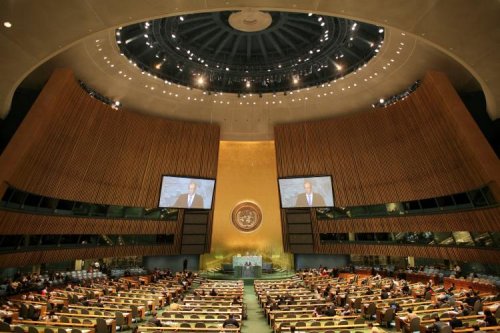![]()
Mon, March 28, 2011 | IsraelNationalNews | by Eli E. Hertz
UN Resolution 377 – A Clear Danger
The significance of the ruling cannot be overstated: It challenges the power of the veto. The UN Charter Does Not Support GA Resolution 377.
Forward:
The Uniting for Peace Resolution 377 of the UN give the General Assembly the ability to bypass the Security Counci in certain circumstances. In it, the General Assembly:
“Reaffirming the importance of the exercise by the Security Council of its primary responsibility for the maintenance of international peace and security, and the duty of the permanent members to seek unanimity and to exercise restraint in the use of the veto,” …
“Recognizing in particular that such failure does not deprive the General Assembly of its rights or relieve it of its responsibilities under the Charter in regard to the maintenance of international peace and security,” …
“Resolves that if the Security Council, because of lack of unanimity of the permanent members, fails to exercise its primary responsibility for the maintenance of international peace and security in any case where there appears to be a threat to the peace, breach of the peace, or act of aggression, the General Assembly shall consider the matter immediately with a view to making appropriate recommendations to Members for collective measures, including in the case of a breach of the peace or act of aggression the use of armed force when necessary, to maintain or restore international peace and security.”
ICJ – Bypassing the UN Security Council
The most recent unlawful use of Resolution 377 was in 2004 when the UN General Assembly called upon the International Court of Justice (ICJ) for an advisory opinion regarding the construction of the fence to stop Palestinian Arab terrorists from infiltrating into Israel.
In an odd conclusion, the ICJ ‘found’ in this case [Advisory Opinion] a “failure of the Security Council to discharge its responsibilities” [E.H., without any reference to law] and then in defiance of the limited powers delegated to it by the UN Charter, by-passed the Security Council’s powers and responsibilities.
Bypassing the Security Council is part of a broader campaign that should alarm all members of the Security Council, and the United States in particular.
Nabil Elaraby, the Egyptian member of the ICJ Bench, openly advocated two main vehicles for institutionalizing it:
“The United Nations membership should, in my view, address ways and means to render the Security Council (a) accountable to the General Assembly, and (b) subject to the possibility, however remote, of a judicial review process.”
And according to Gregory Khalil, the PLO legal advisor in the security barrier case, the ICJ consciously sought to engage the United States in a “Tango of mutual deterrence” and “chart a path for the international community to counter the United States “veto power.”
The significance of the ruling cannot be overstated, he underscores: It challenges the power of the veto and the Security Council’s management of “threats to world peace,” using the International Court of Justice’s interpretations of the rule of international law in matters of ‘threats to world peace’ coupled with claims that the international community is obliged to support its rulings and calling for sanctions — decisions that under Chapter VII of the UN Charter is the sole prerogative of the Security Council. Khalil calls this strategy “vetoing the veto.”
The “Advisory Opinion” signed by the Court’s president, Shi Jiuyong from China, constitutes a profound corruption of its mission and one with seismic implications for the future of international law.
It threatens the security of America and its allies on three levels: first, in its groundbreaking attack on the ‘right to self-defence,’ proscribing an almost blanket prohibition of use of lawful force. Second, it erroneously adopts the exclusive powers granted to the Security Council by the United Nations Charter, a move that will render the Security Council ineffective, and third, in the willingness of the Bench to allow its chambers to become a political instrument and to abandon all semblance of fairness or professionalism, all for political gain.
The threats to the free and democratic states consequently demand a far more serious, systematic and frank response, including a willingness to challenge the competence of this Court. Attempts to shield the International Court of Justice from this disgrace out of concern for its perceived reputation and effectiveness are short-sighted. At all too many junctures it appears that the ICJ’s conclusions are based solely on ‘gut feelings’ and unsubstantiated assumptions – almost taking a leap of faith based on a mixture of personal and collective prejudice and popular opinion.
The Legal effect of UNGA Resolution 377
Article 10 of the United Nations Charter States:
“The General Assembly may discuss any questions or any matters within the scope of the present Charter or relating to the powers and functions of any organs provided for in the present Charter, and, except as provided in Article 12, may make recommendations to the Members of the United Nations or to the Security Council or to both on any such questions or matters.”
The UN Charter does not grant the General Assembly or the International Court of Justice (ICJ) the authority to enact or amend international law. The General Assembly actually lacks the competence to enact general international law. One may easily reach the conclusion that UN member states act on the basis of political concerns, not on fair or legal ground.
Professor, Judge Schwebel, former President of the International Court of Justice stated:
“The General Assembly of the United Nations can only, in principle, issue ‘recommendation’ which are not of a binding character, according to Article 10 of the Charter of the United Nations.”
Schwebel also cited Judge Sir Hersch Lauterpacht, a former member judge of the International Court, who stated:
“The paramount rule of the Charter is that the General Assembly has no legal power to legislate or bind its members by way of recommendation”
Yet another former ICJ judge, Sir Gerald Fitzmaurice, was as resolved in rejecting the “illusion” that a General Assembly resolution can have “legislative effect.”
Referencing Professor Arangio-Ruiz’s work: “The Normative Role of the General Assembly of the United Nations and the Declaration of Principles of Friendly Relations,” Professor Julius Stone called it “perhaps the most comprehensive and up-to-date treatise on this matter” … he [Professor Arangio-Ruiz] is led to conclude that the General Assembly lacks legal authority either to “enact” or to “declare” or “determine” or “interpret” international law so as legally to bind states by such acts, whether these states be members of the United Nations or not, and whether these states voted for or against or abstained from the relevant vote or did not take part in it.
Article 12 of the United Charter states:
“While the Security Council is exercising in respect of any dispute or situation the functions assigned to it in the present Charter, the General Assembly shall not make any recommendation with regard to that dispute or situation unless the Security Council so requests.”
“The Secretary-General, with the consent of the Security Council, shall notify the General Assembly at each session of any matters relative to the maintenance of international peace and security which are being dealt with by the Security Council and shall similarly notify the General Assembly, or the Members of the United Nations if the General Assembly is not in session, immediately the Security Council ceases to deal with such matters.”
The free and democratic world needs to ‘rein in’ the appetite of the General Assembly and to demand of the International Court of Justice not to step beyond its mandate, and respect and obey international laws as set forth in the United Nations Charter.
About the author,
Eli E. Hertz is the president of Myths and Facts, an organization devoted to research and publication of information regarding US interests in the world and particularly in the Middle East. Mr. Hertz is also the Chairman of the Committee for Accuracy in Middle East Reporting. His writings and opinions, unless stated otherwise, are not derived from his position as Chairman of CAMERA.



 RSS
RSS












#UN Resolution 377 – A Clear Danger | #Law http://j.mp/hCm6zX
RT @CrethiPlethi: #UN Resolution 377 – A Clear Danger | #Law http://j.mp/hCm6zX